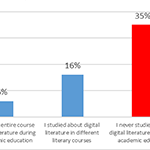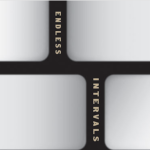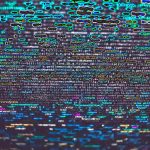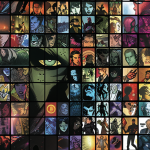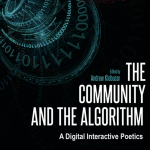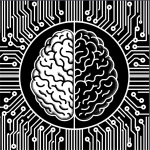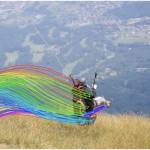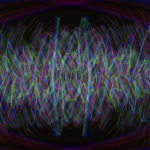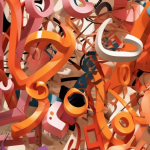2025
Eman Younis and Hisham Jubran's study investigates Arab university students' exposure to digital literature and their attitudes toward it. In doing so, they discover students feel the inclusion of digital literature in university-level literature courses should be a scientific necessity and that its absence in the curriculum compromises their professional development.
Will Luers contributes to current debates on AI by engaging with Jeffrey West Kirkwood's Endless Intervals: Cinema, Psychology, and Semiotics. Luers examines the parallels between AI and cinema technology as "thinking machines," both structured around intervals that produce perceptual and conceptual unities. What we have, in cinema and AI no less than human cognition, "is a reevaluation of the unity of consciousness."
Tuuli Hongisto explores the problems of cyborg authorship through the presentation of ChatGPT as a co-author of literary works on Amazon. Rather than shying away from admitting that an AI took part in the writing process, these authors position ChatGPT and other LLM's as authors with their own rights, rather than tools.
2024
Marino and Berry discuss their engagement in weekly conversations about the nature of "code, of ELIZA, its descendants" and how each of these programs have circulated within our critical code culture, along with other "contemporary conversation agents like Siri and ALEXA and, of course, ChatGPT."
Off center, wayward, slightly off path.... Rettberg and Luers discuss their longrunning encounters with writers, artists, computational film makers and other multidisciplinary "people who come to the electronic literature community, and it’s not only writers, but also artists, visual artists, and you find everyone has a similar kind of wayward path."
Like so many generic literary reconstructions, comics are now being transformed into information -- a process that, for postdoctoral scholar Ilan Manouach, is concomitant with the expansion of tools and services in the field of generative AI. Like so many AI emergences (and emergencies), this one poses important challenges to the comics industry and the careers of comics professionals.
Can ChatGPT or other Chatbot interfaces really write anything better than a feeble imitation of postmodern cut-up techniques? Polina and James Mackay think so, and they offer some reasons for holding onto a human, guiding intelligence in the writing process.
With this brief look at Large Language Model surrealism, Nick Montfort locates and identifies "the id of the internet, of publishing, of podcasting."
Scott Rettberg, director of the Center for Digital Narrative (CDN), in conversation with Nick Monfort, who is leading the CDN's Computational Narrative System's research node.
Daniel Punday reviews Andrew Klobucar’s edited collection of essays, The Community and the Algorithm: A Digital Interactive Poetics.
2023
Multimodal AI trained on YouTube-TikTok-Netflix (object-segmented and identified audio-video-speech) and public domain science data (that exceeds the spectrum of human sensorial field) will be grounded in a world that is in some ways vaster than that experienced by a single human neurophysiology.
Accepting Søren Bro Pold's proclamation that "the social knowledge base of the University has already disappeared", Davin Heckman locates a few, forward looking prospects for a reconstruction of the Humanities in Jean-François Lyotard's "famously sloppy" Postmodern Condition (1971), Hannah Arendt's Human Condition(1958), and Imanuel Kant's prescient hope that the University could serve as a "mediating nexus among a growing array of conflicting professional tendencies."
In this anticipation of John Cayley's ebr essay on Artificial Intelligence, Scott Rettberg contextualizes some of the ethical and systemic problems of ChatGPT and argues that works of electronic literature and digital art might serve as tutor texts for understanding effects of technological mediation on humanity.
Cayley's image is an apt illustration of an essay that's also a work of 'digital language art.' Although Cayley incorporates new material and newly contextualized examples, referring chiefly to his own work, what follows is also the reconfigured rewrite of a recent essay for a series of conferences and a peer-reviewed online journal, Political Concepts, which can be found online at: https://www.youtube.com/watch?v=LDJRQYRWpvQ.
In his response to John Cayley, Dougherty takes the current concern with AIwriting as an opportunity to revive one of ebr's long-running threads; namely: the critical, contrarian riPOSTe.
Pold extends Heckman's "thrilling (if not chilling)" critique to left-wing understandings and critical takes by theorists such as Walter Ong, Bernard Stiegler, and Vannevar Bush.
In his review of Mark Amerika's My Life as an Artificial Creative Intelligence (2022), David Thomas Henry Wright highlights Amerika's negotiation of human, nonhuman, symbiotic creative practices in comparison with more traditional (including traditionally experimental) forms of writing.
Davin Heckman offers thoughts on Matthew Kirschenbaum's now well-known essay in The Atlantic, The Textpocalypse (2023). Contemplating our own limits in digital media scholarship, including the reinforcing of technological determinisms, Heckman discusses the concept of transindividuation and its relationship with technology, or, the process of becoming an individual through participation in culture and society.
Avoiding the "twin pitfalls of either Luddite dread or AI boosterism," in this essay George MacBeth offers a close Re-Reading of Jhave's ReRites.
